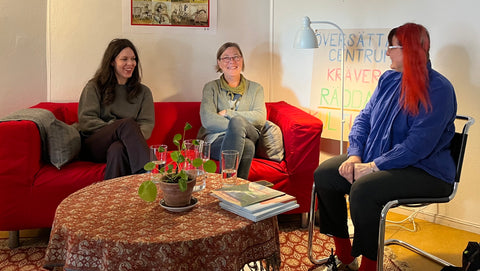On Sunday May 22, pionier press is back at Översättarcentrum in Stockholm to discuss how two of the publishing house's titles went from ideas to bilingual books. The panel consists of Rebecka Mellberg (author of the three-part series »Dead Animals«) and Ingela Bergmann (author and illustrator of »Flytten till Landet Annorlunda/Flyttingen til Annerledeslandet«).
 Rebecka Mellberg (left), Ingela Bergmann (center), Arina Stoenescu (right).
Rebecka Mellberg (left), Ingela Bergmann (center), Arina Stoenescu (right).
Photo: Malin Bohman.
»Dead Animals« was never meant to be a bilingual children's book; in fact, it was never meant to be a book at all! Rebecka Mellberg was creating a »digital dummy« for picture books as part of her thesis work at Södertörn University when she realized that she needed something concrete to put into the digital program - so she wrote a book that soon turned into a trilogy! All three stories pose the question: If animals thought about the meaning of life based on what humans desire, what would they think about, and what would happen to them? The answer is a tragic one that carries important messages about life and death, universal themes that made English the best language to combine with the original Swedish manuscript.
»Flytten till Landet Annorlunda/Flyttingen til Annerledeslandet« is a story inspired by Ingela Bergmann's own experiences as an immigrant to Norway. While living there, she was repeatedly struck by how this culturally and linguistically similar country was still very different from Sweden; especially when it came to certain words that had no Swedish equivalents, such as »dugnad« and »felles.« And yet, the Norwegian government doesn't offer immigrant language teaching to Swedes, since the languages are so alike. Ingela wrote her book to explore how these less apparent differences can still be a source of exclusion, especially for young children. Given the story's setting and target audience, the language combination Swedish-Norwegian was self-evident.


 Rebecka Mellberg (left), Ingela Bergmann (right). Photo: Malin Bohman.
Rebecka Mellberg (left), Ingela Bergmann (right). Photo: Malin Bohman.